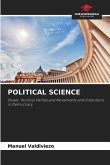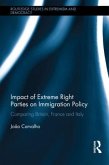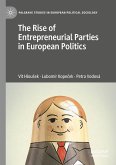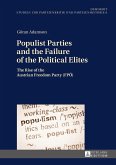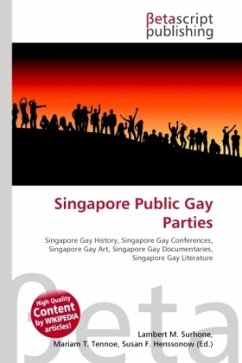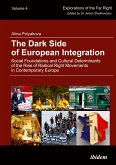Jorge I. Domnguez (ed.)Mexico, Central, and South America
Political Parties
Mexico, Central, and South America
Herausgeber: Domínguez, Jorge I.
Jorge I. Domnguez (ed.)Mexico, Central, and South America
Political Parties
Mexico, Central, and South America
Herausgeber: Domínguez, Jorge I.
- Gebundenes Buch
- Merkliste
- Auf die Merkliste
- Bewerten Bewerten
- Teilen
- Produkt teilen
- Produkterinnerung
- Produkterinnerung
First Published in 2002. Routledge is an imprint of Taylor & Francis, an informa company.
Andere Kunden interessierten sich auch für
![POLITICAL SCIENCE POLITICAL SCIENCE]() Manuel ValdiviezoPOLITICAL SCIENCE26,99 €
Manuel ValdiviezoPOLITICAL SCIENCE26,99 €![Impact of Extreme Right Parties on Immigration Policy Impact of Extreme Right Parties on Immigration Policy]() Joao CarvalhoImpact of Extreme Right Parties on Immigration Policy189,99 €
Joao CarvalhoImpact of Extreme Right Parties on Immigration Policy189,99 €![The Rise of Entrepreneurial Parties in European Politics The Rise of Entrepreneurial Parties in European Politics]() Vít HlousekThe Rise of Entrepreneurial Parties in European Politics38,99 €
Vít HlousekThe Rise of Entrepreneurial Parties in European Politics38,99 €![Populist Parties and the Failure of the Political Elites Populist Parties and the Failure of the Political Elites]() Göran AdamsonPopulist Parties and the Failure of the Political Elites70,50 €
Göran AdamsonPopulist Parties and the Failure of the Political Elites70,50 €![Singapore Public Gay Parties Singapore Public Gay Parties]() Singapore Public Gay Parties22,99 €
Singapore Public Gay Parties22,99 €![Identity of Political Parties in Albania Identity of Political Parties in Albania]() Roland LamiIdentity of Political Parties in Albania47,99 €
Roland LamiIdentity of Political Parties in Albania47,99 €![The Dark Side of European Integration The Dark Side of European Integration]() Alina PolyakovaThe Dark Side of European Integration49,90 €
Alina PolyakovaThe Dark Side of European Integration49,90 €-
-
-
First Published in 2002. Routledge is an imprint of Taylor & Francis, an informa company.
Hinweis: Dieser Artikel kann nur an eine deutsche Lieferadresse ausgeliefert werden.
Hinweis: Dieser Artikel kann nur an eine deutsche Lieferadresse ausgeliefert werden.
Produktdetails
- Produktdetails
- Verlag: Routledge
- Seitenzahl: 290
- Erscheinungstermin: 7. Dezember 2001
- Englisch
- Abmessung: 235mm x 157mm x 22mm
- Gewicht: 625g
- ISBN-13: 9780815336969
- ISBN-10: 0815336969
- Artikelnr.: 22162757
- Herstellerkennzeichnung
- Libri GmbH
- Europaallee 1
- 36244 Bad Hersfeld
- gpsr@libri.de
- Verlag: Routledge
- Seitenzahl: 290
- Erscheinungstermin: 7. Dezember 2001
- Englisch
- Abmessung: 235mm x 157mm x 22mm
- Gewicht: 625g
- ISBN-13: 9780815336969
- ISBN-10: 0815336969
- Artikelnr.: 22162757
- Herstellerkennzeichnung
- Libri GmbH
- Europaallee 1
- 36244 Bad Hersfeld
- gpsr@libri.de
Jorge I. Domínguez is Clarence Dillon Professor of International Affairs and Harvard College Professor at Harvard University and is a member of the Weatherhead Center for International Affairs. He has authored and edited a number of works, including Essays on Mexico, Central, and South America (Garland, 1994), To Make a World Safe for Revolution: Cuba's Foreign Policy (Harvard University Press, 1989), Democracy and the Caribbean (Johns Hopkins, 1993), Democratic Politics in Latin America and the Caribbean (Johns Hopkins, 1999), Toward Mexico's Democratization (Routledge, 1999), and the forthcoming The United States and Mexico: Between Partnership and Conflict (Routledge).
Ames, Barry. Electoral Strategy under Open-List Proportional
Representation. American Journal of Political Science 39 (1995). Domínguez,
Jorge. Shaping Mexico's Electoral Arena: The Construction of Partisan
Cleavages in the 1988 and 1991 National Elections. American Political
Science Review 89 (1995). Shugart, Matthew Soberg. The Electoral Cycle and
Institutional Sources of Divided Presidential Government. American
Political Science Review 89 (1995). Siavelis, Peter. Continuity and Change
in the Chilean Party System. Comparative Political Studies 30 (1997).
Coppedge, Michael. Parties and Society in Mexico and Venezuela. Comparative
Politics (April 1993). Corrales, Javier. Presidents, Ruling Parties, and
Party Rules: A theory on the Politics of Economic Reform in Latin America.
Comparative Politics 32 (2000). Figueiredo, Argelina Cheibub, and Fernando
Limongi. Presidential Power, Legislative Organization, and Party Behavior
in Brazil. Comparative Politics 32 (2000). Stokes, Susan. Constituency
Influence and Representation. Electoral Studies 17 (1998). Jones, Mark.
Presidential Election Laws and Multipartism in Latin America. Political
Research Quarterly 47 (1994). Martz, John D. Political Parties and
Candidate Selection in Venezuela and Colombia. Political Science Quarterly
114 (2000):. Roberts, Kenneth. Neoliberalism and the Transformation of
Populism in Latin America: The Peruvian Case. World Politics 48 (1995).
Gibson, Edward. The Populist Road to Market Reform: Policy and Electoral
Coalitions in Mexico and Argentina. World Politics 49 (1997).
Representation. American Journal of Political Science 39 (1995). Domínguez,
Jorge. Shaping Mexico's Electoral Arena: The Construction of Partisan
Cleavages in the 1988 and 1991 National Elections. American Political
Science Review 89 (1995). Shugart, Matthew Soberg. The Electoral Cycle and
Institutional Sources of Divided Presidential Government. American
Political Science Review 89 (1995). Siavelis, Peter. Continuity and Change
in the Chilean Party System. Comparative Political Studies 30 (1997).
Coppedge, Michael. Parties and Society in Mexico and Venezuela. Comparative
Politics (April 1993). Corrales, Javier. Presidents, Ruling Parties, and
Party Rules: A theory on the Politics of Economic Reform in Latin America.
Comparative Politics 32 (2000). Figueiredo, Argelina Cheibub, and Fernando
Limongi. Presidential Power, Legislative Organization, and Party Behavior
in Brazil. Comparative Politics 32 (2000). Stokes, Susan. Constituency
Influence and Representation. Electoral Studies 17 (1998). Jones, Mark.
Presidential Election Laws and Multipartism in Latin America. Political
Research Quarterly 47 (1994). Martz, John D. Political Parties and
Candidate Selection in Venezuela and Colombia. Political Science Quarterly
114 (2000):. Roberts, Kenneth. Neoliberalism and the Transformation of
Populism in Latin America: The Peruvian Case. World Politics 48 (1995).
Gibson, Edward. The Populist Road to Market Reform: Policy and Electoral
Coalitions in Mexico and Argentina. World Politics 49 (1997).
Ames, Barry. Electoral Strategy under Open-List Proportional
Representation. American Journal of Political Science 39 (1995). Domínguez,
Jorge. Shaping Mexico's Electoral Arena: The Construction of Partisan
Cleavages in the 1988 and 1991 National Elections. American Political
Science Review 89 (1995). Shugart, Matthew Soberg. The Electoral Cycle and
Institutional Sources of Divided Presidential Government. American
Political Science Review 89 (1995). Siavelis, Peter. Continuity and Change
in the Chilean Party System. Comparative Political Studies 30 (1997).
Coppedge, Michael. Parties and Society in Mexico and Venezuela. Comparative
Politics (April 1993). Corrales, Javier. Presidents, Ruling Parties, and
Party Rules: A theory on the Politics of Economic Reform in Latin America.
Comparative Politics 32 (2000). Figueiredo, Argelina Cheibub, and Fernando
Limongi. Presidential Power, Legislative Organization, and Party Behavior
in Brazil. Comparative Politics 32 (2000). Stokes, Susan. Constituency
Influence and Representation. Electoral Studies 17 (1998). Jones, Mark.
Presidential Election Laws and Multipartism in Latin America. Political
Research Quarterly 47 (1994). Martz, John D. Political Parties and
Candidate Selection in Venezuela and Colombia. Political Science Quarterly
114 (2000):. Roberts, Kenneth. Neoliberalism and the Transformation of
Populism in Latin America: The Peruvian Case. World Politics 48 (1995).
Gibson, Edward. The Populist Road to Market Reform: Policy and Electoral
Coalitions in Mexico and Argentina. World Politics 49 (1997).
Representation. American Journal of Political Science 39 (1995). Domínguez,
Jorge. Shaping Mexico's Electoral Arena: The Construction of Partisan
Cleavages in the 1988 and 1991 National Elections. American Political
Science Review 89 (1995). Shugart, Matthew Soberg. The Electoral Cycle and
Institutional Sources of Divided Presidential Government. American
Political Science Review 89 (1995). Siavelis, Peter. Continuity and Change
in the Chilean Party System. Comparative Political Studies 30 (1997).
Coppedge, Michael. Parties and Society in Mexico and Venezuela. Comparative
Politics (April 1993). Corrales, Javier. Presidents, Ruling Parties, and
Party Rules: A theory on the Politics of Economic Reform in Latin America.
Comparative Politics 32 (2000). Figueiredo, Argelina Cheibub, and Fernando
Limongi. Presidential Power, Legislative Organization, and Party Behavior
in Brazil. Comparative Politics 32 (2000). Stokes, Susan. Constituency
Influence and Representation. Electoral Studies 17 (1998). Jones, Mark.
Presidential Election Laws and Multipartism in Latin America. Political
Research Quarterly 47 (1994). Martz, John D. Political Parties and
Candidate Selection in Venezuela and Colombia. Political Science Quarterly
114 (2000):. Roberts, Kenneth. Neoliberalism and the Transformation of
Populism in Latin America: The Peruvian Case. World Politics 48 (1995).
Gibson, Edward. The Populist Road to Market Reform: Policy and Electoral
Coalitions in Mexico and Argentina. World Politics 49 (1997).



